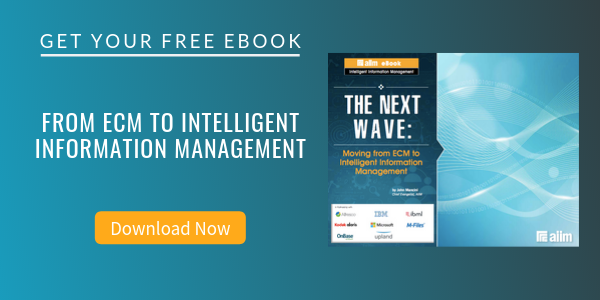
Guru Focus vs. Real World in Information Management
Enterprise Content Management (ECM) | Intelligent Information Management (IIM)
I've been both reading and listening (I know, very nerdy) to Tom Peters' new Little Big Things: 163 Ways to Pursue Excellence. Lots of thought-provoking ideas and the audio is a hoot because a) Tom does it himself, and b) a book with lots and lots of repetition and big giant letters comes across interesting as an audiobook, particularly when one is running around and around and around a 1/16 mile track.
Guru Focus vs Real World Focus
One of the items I especially like is his discussion of "Guru Focus" vs. "Real World." The more I thought about it, the more relevant it seems to the world of content and information management. His point is that there is a difference between what goes on in the theoretical world of gurus, pundits, and analysts and what goes on in the real world of actually trying to get things done.
Guru Focus tends to be on Fortune 100 companies in cool businesses with presences around the world. Real World tends to be the land of small and mid-sized organizations, in not terribly sexy businesses, doing what it takes to get things done.
Two of his examples serve to illustrate some of the challenges that we have in our industry:
Example 1
Guru Focus: An encompassing IS-IT strategy, with everything wired to everything else.
Real World: While integrating IS is very important, most of us muddle through, trying to ensure that the IT-enhanced bits (the front line subsystems) are marvels of simplicity that deliver the goods for those front line folks and their internal-external customers.
Example 2
Guru Focus: Imposing word-phrases like "business models," "scalable," "strategic talent management," "customer retention management," and "knowledge management paradigm."
Real World: Most of us try to use everyday language, such as "the way we make a buck" (instead of "business models"), "let's grow this sucker" (not, is it "scalable?"), "hire good people and treat 'em well and give them a chance to shine and thank 'em for the stuff they do" ( rather than "strategic talent management"), "bust our asses to keep our customers happy and keep em coming back" (instead of customer retention management) and "share the stuff you learn with everybody ASAP, don't hoard it" (rather than "executing a knowledge management paradigm").
How We're Defining Enterprise Content Management
With these observations in mind, I took a look at the top results that come back when you Google "define Enterprise Content Management."
- Enterprise Content Management (ECM) is the strategies, methods, and tools used to capture, manage, store, preserve, and deliver content and documents related to organizational processes (OK, I'll own that one.)
- Enterprise content management (ECM) is a set of tools and methods that allows a corporation, agency, or organization to obtain, organize, store, and deliver information crucial to its operation.
- Abbreviated as ECM, Enterprise Content Management is the document management term that describes the technologies used by organizations to capture, manage, store, and control enterprise-wide content, including documents, images, e-mail messages, instant messages, video, and more. ECM software is used to assist in content control associated with business processes and can be used to assure compliance (Sarbanes-Oxley, HIPPA, [sic], etc.).
- Enterprise Content Management (ECM) is an “umbrella term” and represents a vision and framework for integrating a broad range of content management technologies and content formats.
- Enterprise Content Management (ECM) is the strategies and technologies employed to manage documents and content across the enterprise.
I also took a look at some of the definitions on the websites of leading vendors.
- Enterprise Content Management helps companies make better decisions faster by managing content, optimizing processes, and enabling compliance through agile ECM solutions and advanced case management.
- A content management system is designed to fill in gaps between your related processes, applications, and departments. If you are losing critical documents, have little to no visibility into your everyday business processes or can’t easily find information when you need it, a content management solution can help.
- Enterprise content management enables organizations to leverage enterprise knowledge assets for competitive advantage.
- Content Management reduces costs by delivering these benefits: 1) Streamlined processes—Improve paper-based processes while reducing document storage and shipping costs; 2) Increased productivity—Increase productivity across users and throughout workgroups; 3) Unified infrastructure—Unify content creation points of documents, files, web content, and digital assets.
Thinking about Peters' comments, two things strike me: 1) we are way too guru focused, and 2) we need more passion. To be frank, all of these definitions are a bit boring. And I acknowledge we are all culpable.
YAWN!
ECM is Anything But Boring
I raise this because what organizations are doing with content management is ANYTHING BUT BORING. When I talk to users -- and this isn't just at big Fortune 500 customers, in fact, even more so at mid-sized organizations, I usually don't hear boredom, I hear excitement. Lots and lots and lots and lots of excitement. So I decided to test this a bit for a recent keynote I did. Prior to the keynote, I did a survey of the users of the vendor. Here are some of the results. I am convinced these data points are NOT atypical...
60% agree = “XXXX has much improved our response to customers, suppliers, and colleagues.”
63% agree = “We wouldn't now want to manage the business without our XXXX system.”
81% = “The ROI for XXXX was equal to or better than expected.”
And the piècede résistance...
“How important is XXXX to your organization’s business goals and success?”
- 68% =“imperative” or “significant”
- 26% = “average”
- 6% =“minimal” or “none”
Well, heck. That ain't boring! If we were talking like real people rather than gurus and experts and poobahs, what might we say about content and document management?
"We couldn't live without it!"
"It has totally changed the way we do business!"
"Our customers love us!"
"It has saved us big bucks!"
Ahhh! That feels better.
About John Mancini
John Mancini is the President of Content Results, LLC and the Past President of AIIM. He is a well-known author, speaker, and advisor on information management, digital transformation and intelligent automation. John is a frequent keynote speaker and author of more than 30 eBooks on a variety of topics. He can be found on Twitter, LinkedIn and Facebook as jmancini77. Recent keynote topics include: The Stairway to Digital Transformation Navigating Disruptive Waters — 4 Things You Need to Know to Build Your Digital Transformation Strategy Getting Ahead of the Digital Transformation Curve Viewing Information Management Through a New Lens Digital Disruption: 6 Strategies to Avoid Being “Blockbustered” Specialties: Keynote speaker and writer on AI, RPA, intelligent Information Management, Intelligent Automation and Digital Transformation. Consensus-building with Boards to create strategic focus, action, and accountability. Extensive public speaking and public relations work Conversant and experienced in major technology issues and trends. Expert on inbound and content marketing, particularly in an association environment and on the Hubspot platform. John is a Phi Beta Kappa graduate of the College of William and Mary, and holds an M.A. in Public Policy from the Woodrow Wilson School at Princeton University.



